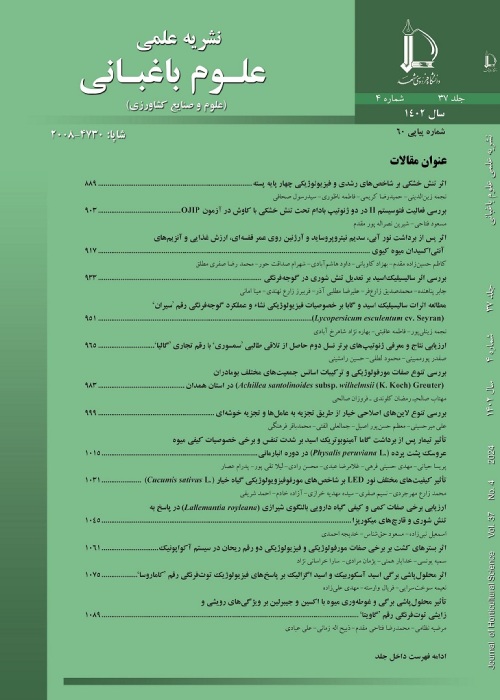Impacts of Nanosized and Bulk Titanium Dioxide on Flowering and Morpho-physiological Traits of Petunia (Petunia hybrida) under Salinity Stress
Author(s):
Article Type:
Research/Original Article (دارای رتبه معتبر)
Abstract:
Introduction
Titanium is the ninth most abundant element and the second most transition metal found in the earth’s crust (about 6.320 ppm). There has been a rising demand for nanotechnology-based products in recent years, particularly in areas directly related to humans. Nanotechnology has many applications in agricultural research, such as in reproductive science and technology, the transfer of agricultural and food waste to energy and other helpful by-products through enzymatic nanobioprocessing.An important effect of titanium compounds on plants used for improvement of yield (about 10–20%) in various crops. Other effects of titanium on plants are increasing contents of some essential elements in plant tissue; an increase in enzyme activity such as peroxidase, catalase, and nitrate reductase activities in plant tissue, and research has shown increased chlorophyll content in paprika (Capsicum anuum L.) and green alga (Chlorella pyrenoidosa). Nanotechnologyapplication is now widely distributed throughout life, and especially in agricultural systems. Nano particles, because of their physicochemical characteristics, have been considered the potential candidates for modulating the redox status and changing in seed germination, growth, performance, and quality of plants.nano-TiO2 has shown to be potential for agricultural application because of its photocatalytic disinfection and photobiological effects. Also,stalinizationof soils or waters is one of the world’s most serious environmental problemsin agriculture. During initial exposure to salinity, plants experience water stress, which in return reduces leaf expansion. during long-term exposure to salinity, plants experience to ionic stress, which can lead to premature senescence of adult leaves, which led to a reduction in the photosynthetic area available to support plants growth.However,a few studies have been done on the effects of nanoparticles on ornamental plants. Nanosized TiO2 is a frequently used nanoparticle, consequently there has been an exponential increase in data collection on the effects of TiO2 nanoparticles on different species. There is much less information on the effects of nanoparticles on plants compared to animals. Studies of the effects of TiO2 nanoparticles on plants provide information about the positive and stimulating effects as well as any negative impact. In this study, weaimedto findout the phytotoxicity or positive effects of different concentrations of Bulk TiO2 and nanosized TiO2 on plant growth of Petunia hybridain salinity stress.
Material and
Method
experiments were done to assess the effect of different concentrationsof bulk and nanosized TiO2 on petunia growthin salinity stress in a factorial test based on completely randomized design with 3 replications in agriculture faculty of Ferdowsi University, Mashhad. There were 3 factors, including1- three concentrations (0, 75 and 150 mM) of NaCl, 2- bulk and Nanosized titanium dioxide and 3- six concentrations (0, 5, 10, 15, 20 and 40 ppm) of TiO2. Titanium dioxide treatments for foliar application was applied 5 times with intervals of seven days (three times before, and twice after starting salinity stress). The experiment was performed at the College of Agriculture, Ferdowsi University of Mashhad. during the flowering, flower number, corolla length, flower diameter and flower fresh weight were measured. At the end of the flowering phase, parameters such as leaf area, shoot and leaf fresh weight, lateral shoot number, leaf number, chlorophyll a, b, total and cartenoidwere measured. The data were subjected to Analysis of Variance, was done using Mstat-C statistical. The means were separated, using LSD test.
Results and Discussion
Results showed that interaction of salinity, bulk and nanosized titanium dioxide and titanium dioxide concentrationsweresignificanton total chlorophyll, cartenoides, biomass, leaf area and flower number. The highest amount of total chlorophyll concentrations was measured in 20 and 40 ppm TiO2 and 5 ppm Nano treatments, respectively. The highest leaf area (608 cm2) was in 15 ppm Nano treatment. Among levels of nano TiO2,foliar application with 5 ppm had the best flower diameter in general, foliar application of nano titanium dioxide and titanium dioxide have been effective in improving the effects of salinity stress. In addition, the use of titanium dioxide in the highest level (40 ppm) and use of nano titanium dioxide in less concentration in Petunia plant had better effect on morphological traits. An important effect of titanium compounds on plants used for various crops is yield improvement. The positive effects of TiO2 could be probably due to the antimicrobial properties of engineered nanoparticles, which can enhance strength andresistance of plants to stress.Keywords:
Language:
Persian
Published:
Journal of horticulture science, Volume:32 Issue: 2, 2018
Pages:
199 to 212
magiran.com/p1880352
دانلود و مطالعه متن این مقاله با یکی از روشهای زیر امکان پذیر است:
اشتراک شخصی
با عضویت و پرداخت آنلاین حق اشتراک یکساله به مبلغ 1,390,000ريال میتوانید 70 عنوان مطلب دانلود کنید!
اشتراک سازمانی
به کتابخانه دانشگاه یا محل کار خود پیشنهاد کنید تا اشتراک سازمانی این پایگاه را برای دسترسی نامحدود همه کاربران به متن مطالب تهیه نمایند!
توجه!
- حق عضویت دریافتی صرف حمایت از نشریات عضو و نگهداری، تکمیل و توسعه مگیران میشود.
- پرداخت حق اشتراک و دانلود مقالات اجازه بازنشر آن در سایر رسانههای چاپی و دیجیتال را به کاربر نمیدهد.
In order to view content subscription is required
Personal subscription
Subscribe magiran.com for 70 € euros via PayPal and download 70 articles during a year.
Organization subscription
Please contact us to subscribe your university or library for unlimited access!



